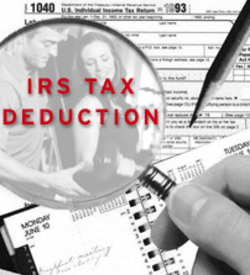
If you bought or sold a home last year don’t miss these frequently overlooked deductions. Here are 10 ways you may able able to get some real estate deductions on your taxes!
- Home Purchase Mortgage/Loan Fees: If you bought a home last year it’s likely you took out a mortgage for the purchase. In nerdy finance speak, that was called an “acquisition mortgage” because it allowed you purchase the home (vs an equity loan you took out after you owned the property) If you paid a loan points at closing to get the loan then the fees qualify as an itemized interest deduction.
2. Home improvement loan fees: If you paid a loan fee to take out a home improvement loan, the loan fee may be deductible in the tax year it was paid.
3. Loan fees paid to refinance a home loan or borrow against other real estate: If you refinanced your existing home loan last year, or borrowed against other real estate, any loan fees you paid may be deductible, some over the life of the loan.
4. When refinancing, deduct any un-deducted loan fees: Thanks to low mortgage interest rates, many home owners refinanced again last year after previously refinancing a year or two earlier. These home owners should remember to deduct on last year’s income tax returns any un-deducted loan fees from a prior mortgage refinance.
5. If you bought or sold property last year, remember to deduct prorated real estate taxes: A major tax deduction many real estate buyers and sellers overlook is the prorated property tax they paid at the close of escrow. Even if the other party remitted the payment to the tax collector, but you were charged a prorated portion of the tax bill, be sure to deduct your share on your last year’s return.
6. Deduct prorated mortgage interest in the year of property purchase or sale: Similarly, if you bought a residence (or other real estate) and took over an existing mortgage, don’t forget to deduct your prorated interest share for the month of the sale (even if the seller made the payment to the lender). Your closing settlement statement shows your prorated share of mortgage interest.
7. When land rent payments qualify as interest deductions: Millions of homes are located on leased land and Internal Revenue Code 163(c) allows land rent to be deducted like interest when the lease: (a) is for at least 15 years, including renewal periods; (b) is freely assignable; (c) contains a present or future option to buy the land; and (d) is like a security interest, such as a mortgage. Of course, payments to buy the land are not deductible, nor are ground rent payments deductible if you do not have the option to buy the land, such as in a mobile home park.
8. Mortgage prepayment penalty: If you paid off an existing mortgage early and were charged a prepayment penalty by the lender, that prepayment penalty qualified as a itemized deduction.
9. Home construction loan interest: If you built a new home last year, or are building one now, don’t forget to deduct the construction loan interest paid. It’s deductible if the construction period does not exceed 24 months before occupancy of your principal residence.
10. Deduct prepaid property taxes and mortgage interest: If you prepaid this year’s real estate taxes last year, as homeowners do to increase their tax deductions, or if you paid your January of this year mortgage payment in December of last year, don’t forget to deduct these extra mortgage interest and property tax payments on last year’s income tax return.
I hope this was helpful for you! As always, you should consult with a Legal and Tax Professional. If you need a great resource, give BJ McGraw a call with McGraw & McGraw CPA in Westminster. He has been my CPA for years and does an amazing job. He’s trustworthy, responsive, and affordable. His office line is 303-427-6641 x 26 – Let him know I sent you 🙂



Leave a Reply